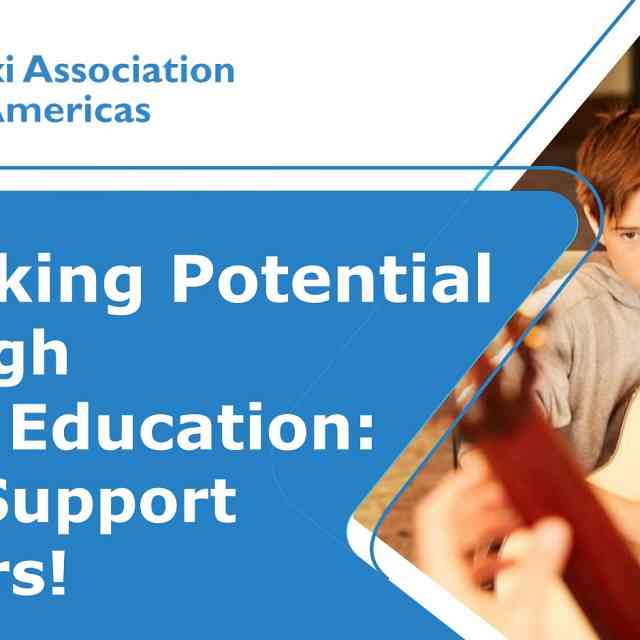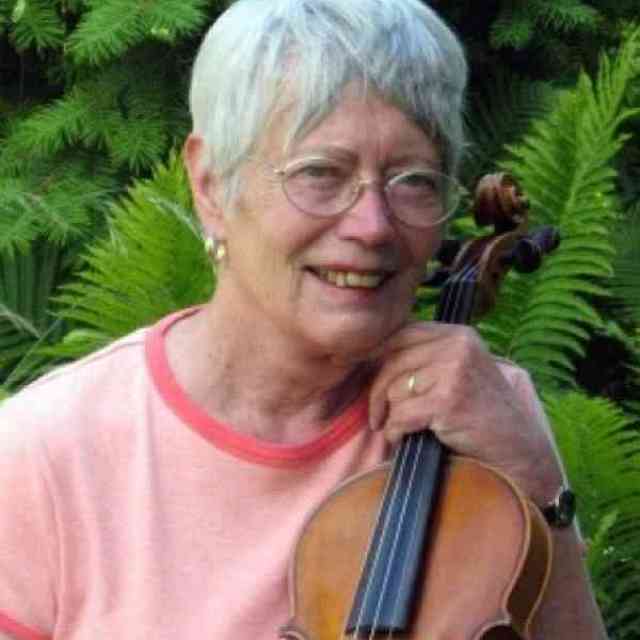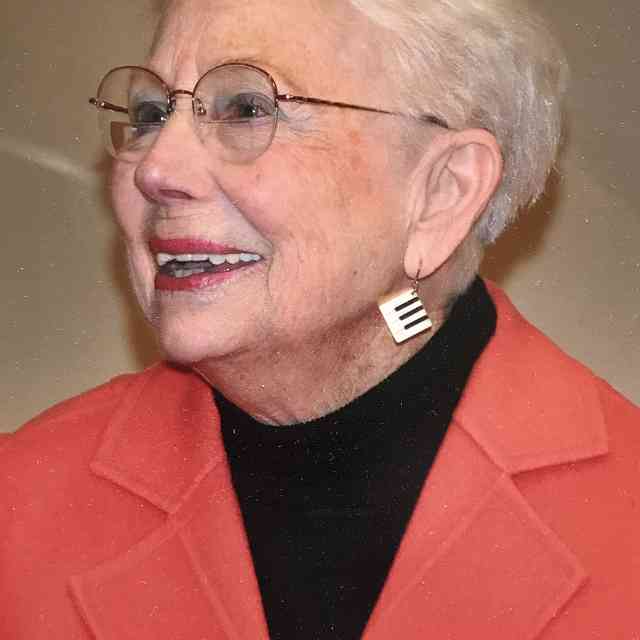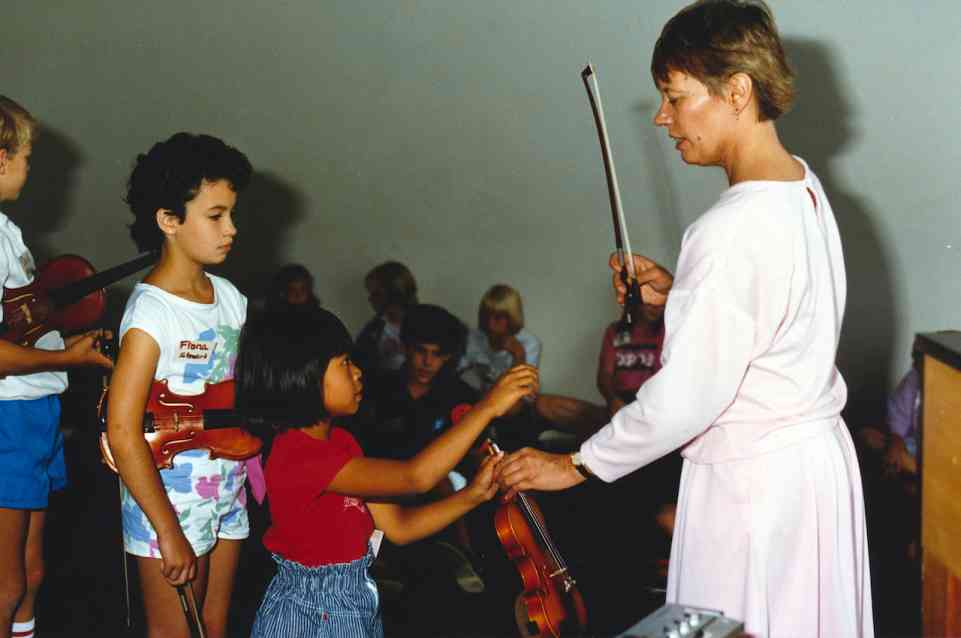
Daphne tunes violins at group class circa 1970s.
All Canadian Suzuki teachers were saddened to learn of the passing of Daphne Hughes, Suzuki violin teacher, trainer, and parent.
To me, Gail was a longtime colleague and friend of fifty years. Daphne and I met in Guelph, Ontario in 1972. I had enrolled my son in Suzuki violin lessons with a relatively new teacher in a city 45 minutes away. The drive with a three-and-a-half-year-old and an eighteen-month-old was challenging, so I was soon motivated to ask the association that organized the Suzuki instruction (Philharmonic Children of Hamilton) if they would consider sending a teacher one day a week to Guelph. It was agreed that if I found ten students for the teacher, a satellite class would be arranged.
I began to call people who had young children and were interested in music. One particular mother I called suggested I contact someone named Daphne Hughes. I had never heard of her, nor had my chemist husband run into philosopher Bill Hughes (Daphne’s husband) on the University of Guelph campus. When I reached Daphne and asked if she had kids who might like to learn to play the violin, she replied: “I might want to teach this myself.” That was the beginning!
The Hamilton organization, in fact, enlisted two violinists to set up the Guelph satellite Suzuki class: Daphne and Hazel Comer; the two of them drove to Tennessee to take their first Suzuki course with Suzuki pioneer Bill Starr. Back in Guelph, there were now twenty students enrolled for lessons, three of them being Daphne’s children; her fourth child was destined to be a cellist. The lessons were run under the auspices of the Hamilton program for the first year.
By the spring of 1973, however, we knew we wanted to form a program based in Guelph. And that is how it came to be: in the summer of 1973 the Suzuki String School of Guelph (SSSG) was founded in Daphne and Bill’s living room. Hazel and Daphne were the teachers, and I was the parent/administrator and accompanist.
Daphne totally embraced the Suzuki approach to working with each child as an individual. Being a Suzuki parent at the same time, she recognized that the parent was part of what Suzuki teachers like to call the Suzuki triangle. She also recognized that as a teacher she needed to observe others teach. Daphne began going to Ithaca in the late 1970s, where she worked with another “pioneer”: Sandy Reuning. Among her colleagues were already established and exceptional teachers such as Teri Einfeldt, her husband David, Carol Smith, and Kathy Wood among others. In 1984, Daphne made the pilgrimage to Japan to observe and work with Dr. Suzuki for four months. Some years later, when Dr. Suzuki died in 1998, Daphne and one of her students were interviewed nationwide on the very popular CBC radio program This Morning with Michael Enright as host.
It is obvious that Daphne, too, could be called a pioneer. Within ten years of that first trip to Tennessee, Daphne was investigating new avenues to benefit her students. Daphne and her husband Bill recognized that an orchestra was needed for all these string students. Bill, in particular, championed this cause and by 1979, the Guelph Youth Orchestra was formed.
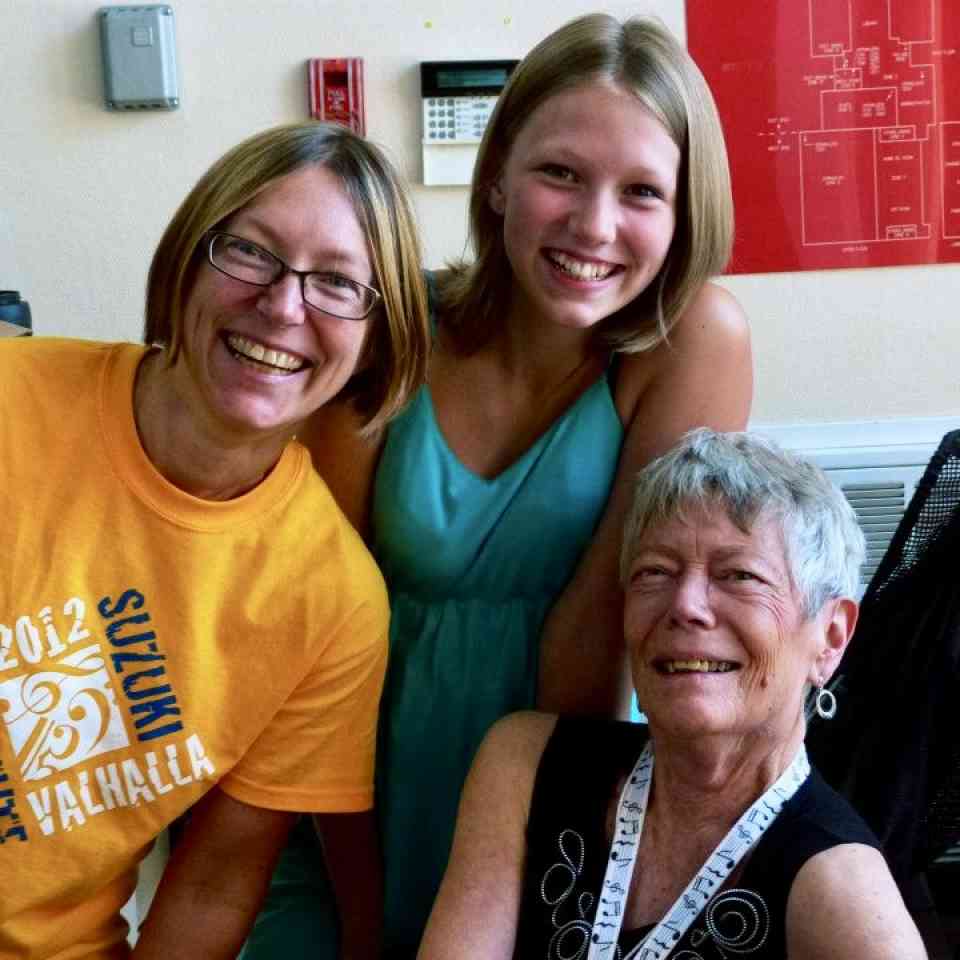
Miranda Hughes, Sophie Burkholder, Daphne Hughes (left to right) at the Valhalla Suzuki Institute.
Having recognized the benefits of the summer institute for teachers, students and their parents, Daphne gathered a group of active parents and faculty to contemplate establishing an institute for strings in Guelph. The first Guelph Suzuki String Institute (GSSI) was held in 1983 at the University of Guelph. Daphne was able to attract many colleagues from the northeastern United States, as well as Canadian teachers from several provinces. GSSI was a highly respected and popular institute. It subsequently evolved into the Southwestern Ontario Suzuki Institute which encompasses Suzuki piano as well, and continues to this day in nearby Waterloo, Ontario.
Then when Bill retired from the Philosophy Department, Daphne and Bill decided to move to New Denver, B.C., where their eldest daughter was raising their first grandchildren. It was indeed a sad day for the Suzuki community in Guelph—and in Ontario. Daphne and I said our farewells at the SAA Conference in Minneapolis in 1998.
Upon her move to British Columbia, Daphne began contributing more of her energy, and her considerable writing skills, to projects with the SAA. All told, she penned nineteen articles for the ASJ and served for a time as Violin Editor. She participated in the committee that formulated the Every Child Can! introductory Suzuki course and accompanying course book, for which she wrote the appendix. She also contributed to the creation of the Suzuki Principles in Action (SPA) course. She and I met in Toronto and presented one of the first pilots of this course at the Royal Conservatory of Music. The Appendix of the course manual, a collection of thought-provoking reference materials that supplement each chapter of the course was essentially written by Daphne. It is to my mind one of the best aspects of the course.
While the move to B.C. had been envisioned as a form of semi-retirement in which she would focus primarily on teacher development and writing activities, Daphne happily stepped up to help out with her daughter’s small studio of violin students. She enjoyed this so much that she continued to take on new students, including her own grandchildren, over several years. She found herself back at her Suzuki roots as the teacher to a fledgling array of recent beginners, and having four small string players in the family again. The village was also a new environment in which to express the idea that Every Child Can. New Denver was no university town with a typical self-selection of incoming students from relative privilege. Many of the families she worked with were headed by part-time laborers, off-grid homesteaders, or seasonal service-industry workers, and most had made a conscious decision to reside in a remote area that allowed space for decidedly alternative outlooks. Daphne delighted in meeting these families where they were at and bringing them into the Suzuki fold.
After Bill’s death in 2003, she developed an itch for a new Suzuki project, and proposed the launch of a summer institute in New Denver that would reflect the small rural community in which it was hosted. The idea wasn’t so much to serve the students of established Suzuki programs as had been the case in Ontario, but to provide students studying in small part-time studios throughout western Canada with the opportunity to enjoy an intensive and fully-rounded Suzuki experience with like-minded families. The Suzuki Valhalla Institute has embodied that vision, and has just completed its eighteenth successful year.
Besides her leadership in inspiring the creation of GSSI/SOSI, and the Valhalla Institute, Daphne was always involved with Canadian, and particularly, Ontario colleagues. In the early 1990s, she was one of the founders of the Suzuki Association of Ontario, an organization that brings Ontario teachers together every year, and in 2008 was the keynote speaker for the whole conference.
After rheumatoid arthritis put an unfortunate end to Daphne’s playing and teaching in New Denver, various friends and colleagues suggested that she return to Guelph, where she still had colleagues and family. The move back happened in 2012. After a brief time spent living in a condo, Daphne moved into a retirement community. In her apartment, she was able to bring many of her favorite possessions. She had a new circle of acquaintances there, and many visits from family, friends, and colleagues.
Even when it was no longer possible for Daphne to be actively involved in Suzuki events, she never lost interest. We would see each other at concerts and celebratory events in Guelph. After a conference, a retreat, or a summer institute, I always looked forward to a visit with her to pass on my “Suzuki report” and she continued to take an attentive interest in the larger Suzuki world. Daphne passed away in July after a period of illness. Like many, I have lost a dear friend and colleague. Daphne and I supported each other’s endeavors and shared so many experiences over the fifty-one years, but the memories will live on. Dr. Suzuki brought us together but the friendship is forever.
A Mentor and Friend
By Paule Barsalou
I was one of Daphne’s mentees, colleagues, and close friends. She was like a second mother to me. After completing my master’s of music performance and Suzuki pedagogy at the Cleveland Institute of Music under Michele Higa George in 1989, I was looking for a program to join where I could acquire experience and receive mentorship. When we discovered that the Suzuki String School of Guelph had a full-time position open, Michele strongly encouraged me to apply.
I moved to Guelph that fall. Daphne took me under her wing from the get-go, as she did for so many other teachers before and after me. Pedagogical discussions over tea and dinners were an almost weekly occurrence. From the start, Daphne treated me as a colleague, discussing teaching, attending conferences together, including me in the teacher training courses she offered in her home studio and giving me advice on challenging students. At first, I was surprised by her directness. Her husband, Bill, told her she had to be careful about how she said things to me because I took every word to heart and could sometimes feel hurt. Daphne was surprised at this as she was so humble; she didn’t see why a less experienced teacher might put her on a pedestal and be very sensitive to her remarks. She thought of other teachers as peers with whom she could share her thoughts in the spirit of mutual growth for the good of our students.
I grew to take her comments as intended. In that spirit, I asked her to observe my teaching and give me feedback. We did this exercise before the creation of the SAA Practicum Unit. She spent two weeks observing my teaching and wrote a full report, which we reviewed over tea. She refused to accept any compensation!
After I had spent a few years in Guelph, Daphne tapped into my interest in organizing things. She asked me and another Suzuki teacher, Olga Kalyniak, to organize various aspects of the Guelph Suzuki Institute. She supervised us as we worked on scheduling at her dining room table. The next thing we knew, we found ourselves directing the institute the following year. Interesting how these things happen.
At one point, Daphne started encouraging me to become a teacher trainer. At first, I was very overwhelmed by the whole idea, so she proposed to mentor me through the application process. That was a huge help! After she moved to New Denver, B.C., I sent her videos of my teaching, reviewed her feedback, and sent her more videos. Gradually, I completed my application and was successful. Again, she wouldn’t take a penny for her work!
When I became director of the Suzuki school in Guelph, Daphne was again very supportive, always curious about the projects we embarked on as a school. After she came back to Guelph, we would sit around in her apartment discussing artistic vision and leadership over tea. She would question me and push me to clarify my thoughts. We didn’t always agree, but having such a caring friend and sounding board in my corner was amazing. Again, our aim was always for the good of the students and the Suzuki community.
I was not the only recipient of Daphne’s generous mentoring. All over Canada, teachers were encouraged and supported by her in teacher training classes, quiet conversations, and taps on the shoulder. We all owe her a massive debt of gratitude. How would I describe Daphne? Visionary, determined, generous, humble, empathetic, a woman of action, and an excellent tea-drinking companion.
The authors Paule and Gail wish to acknowledge the contributions to Daphne’s story by her daughter Miranda Hughes, who was also an invaluable consultant and editor to both of us.


